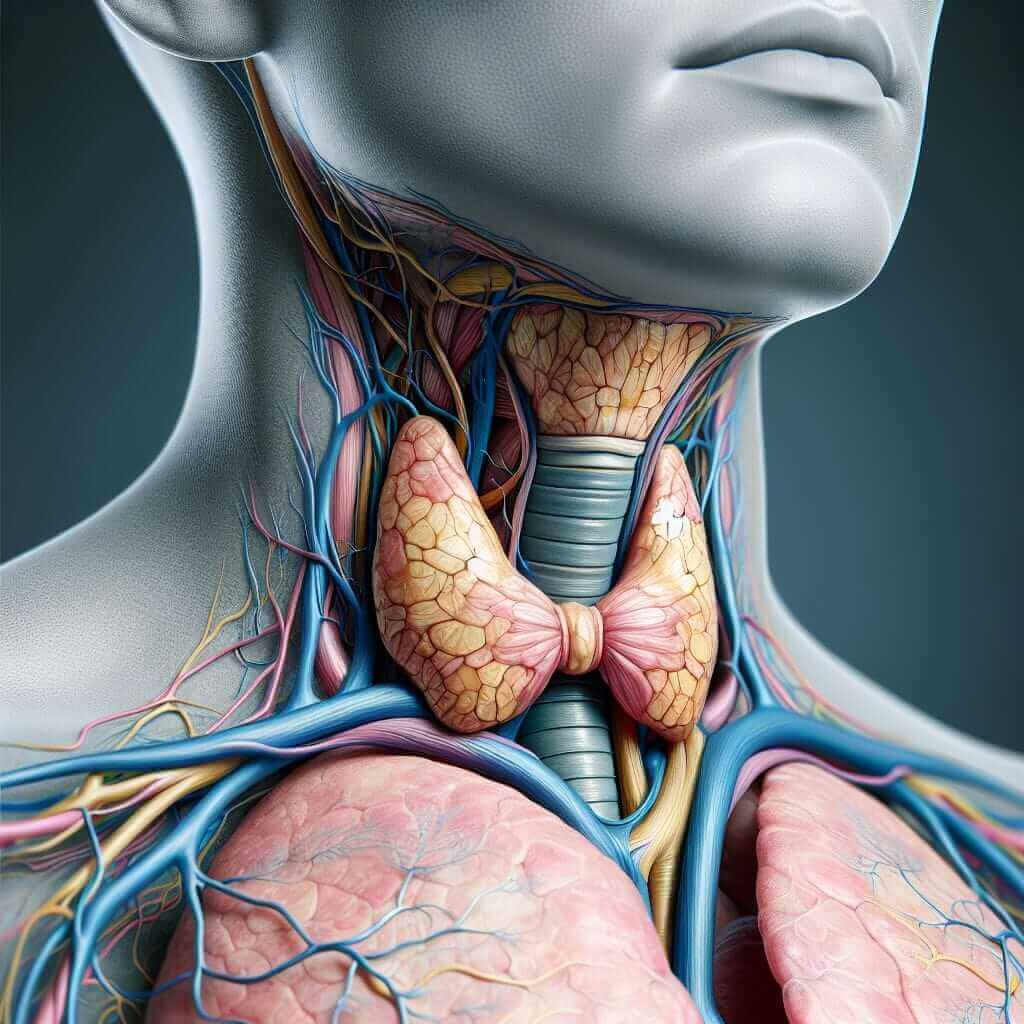The IELTS exam often features topics related to health and well-being, and the thyroid is a gland that can come up in various contexts. Understanding how to use vocabulary related to the thyroid accurately and confidently can be beneficial for your IELTS performance.
Here’s a breakdown of the term “thyroid” and other related vocabulary to help you ace your IELTS exam:
What is the Thyroid?
Thyroid (noun /ˈθaɪ.rɔɪd/) is a small, butterfly-shaped gland located in the neck. It produces hormones that regulate metabolism, growth, and development.

Here are some synonyms and related terms:
-
Endocrine gland: (noun /ˈen.də.krɪn ˌɡlænd/) This is a general term for glands that secrete hormones directly into the bloodstream. The thyroid is an example of an endocrine gland.
- Example: The endocrine system, including glands like the thyroid and pituitary, plays a vital role in regulating various bodily functions.
-
Hormone: (noun /ˈhɔːr.moʊn/) A chemical messenger that travels through the bloodstream to target cells and organs, influencing their function.
- Example: The thyroid gland produces hormones that affect metabolism.
-
Metabolism: (noun /məˈtæb.ə.lɪ.zəm/) The chemical processes within the body that convert food into energy and sustain life.
- Example: An overactive thyroid can lead to a faster metabolism.
Thyroid in the IELTS Exam
Vocabulary related to the thyroid can appear in various sections of the IELTS exam:
- Listening: You might hear a conversation between a doctor and a patient discussing thyroid problems or a lecture on endocrine health.
- Reading: Passages may discuss health trends, scientific research on hormones, or personal experiences with thyroid conditions.
- Writing Task 2: An essay question could ask you to discuss the causes and effects of hormonal imbalances or the importance of a healthy lifestyle for endocrine health.
- Speaking Part 1: You might be asked about your general health or lifestyle habits that can impact thyroid function.
Using Thyroid Vocabulary in the IELTS
Here are examples of how you can use thyroid-related vocabulary in different sections of the IELTS:
Listening:
- Script: “The doctor diagnosed her with hypothyroidism, which explained her fatigue and weight gain.”
- Question: What was the patient’s diagnosis?
- Answer: Hypothyroidism
Reading:
- Passage excerpt: ” Iodine deficiency is a leading cause of hypothyroidism, especially in developing countries where access to iodized salt is limited.”
- Question: What is a major contributor to hypothyroidism?
- Answer: Iodine deficiency.
Writing Task 2:
Prompt: Some people believe that maintaining a healthy lifestyle is crucial for preventing hormonal imbalances. Discuss both views and give your opinion.
Example sentence: “Furthermore, a balanced diet rich in iodine and selenium can support optimal thyroid function and prevent conditions like hypothyroidism.”
Speaking Part 1:
- Examiner: Do you think it’s important to have regular health check-ups?
- Candidate: Absolutely, I believe regular check-ups are vital. They can help detect potential issues early on, such as thyroid problems, which can be easily managed with medication if caught early.
Common Thyroid-Related Collocations:
Here are some common collocations using “thyroid” and related terms to enhance your vocabulary:
- Thyroid function: The way the thyroid gland works.
- Example: Regular blood tests can monitor thyroid function.
- Thyroid hormones: The hormones produced by the thyroid.
- Example: Thyroid hormones are essential for growth and development in children.
- Thyroid disorder: Any condition that affects the thyroid gland.
- Example: Thyroid disorders are more common in women than men.
- Overactive thyroid (Hyperthyroidism): A condition where the thyroid produces too much hormone.
- Example: Symptoms of an overactive thyroid include weight loss, anxiety, and rapid heartbeat.
- Underactive thyroid (Hypothyroidism): A condition where the thyroid doesn’t produce enough hormone.
- Example: Hypothyroidism can cause fatigue, weight gain, and depression.
- Thyroid medication: Medicines used to treat thyroid disorders.
- Example: She takes daily thyroid medication to manage her hypothyroidism.
Conclusion
Being familiar with the vocabulary related to the thyroid gland and its functions can be advantageous in the IELTS exam. By understanding the meaning, usage, and collocations of these terms, you’ll be better equipped to demonstrate your vocabulary range and accuracy. Remember to practice using this vocabulary in context to enhance your fluency and confidence.